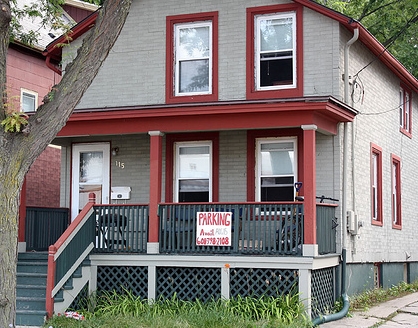A series of changes to the city’s Probationary Rental Occupancy Permit ordinance program could mean a tenfold increase in the number of properties deemed problematic.
Staff from the city attorney’s office presented several proposed changes to the City Council’s Budget and Economic Development Committee Tuesday. The city attorney’s office is in the process of rewriting the law to comply with a state statute passed last summer.
The state law removed violations that would result in immediate entrance into PROP, such as allowing a renter to move back into his or her unit after it was deemed unsafe or unfit by the Inspections Department. It also eliminated the requirement for PROP landlords to complete the city’s Landlord Training course.
But the new state law also means the city can make some parts of the PROP more strict — and that means more property owners will see penalty fees.
What is PROP?
Under a city ordinance approved in 2005, problem rental properties — those that are in constant violation of zoning or criminal laws — become part of PROP.
Learn more: Read our analysis of the PROP, five years after it was passed.
PROP provides renters and neighbors a place to report landlords for unsuitable living conditions, excessive garbage and loud parties. Landlords can also use PROP to rid themselves of problem tenants by including the program’s violations in leases as a reason for eviction.
A property enters PROP after it receives multiple violations, resulting in a probationary rental period for two years. Since the PROP is attached to the property, it remains in the program even if the ownership changes.
The Changes
Prior to the law change, a property entered the program if it experienced four violations within a two-year period. The state law decreased that time to only one year.
Today, there are 11 properties that are in PROP. About half of those will be coming out of the program soon, but the changes could increase the number of eligible properties tenfold. A property comes out of the PROP program if it has met all city codes during its two-year probationary period.
In addition, the current ordinance states that a property must have multiple violations of one type to be entered into PROP, but city staff recommends changing it so that any combination of multiple violations would send the property into the program.
Along with the changes to the way PROP is conducted, the city will consider an increase the penalty fees paid by violators.
“Another way to strengthen the PROP program — and this is a great way to deter landlords from entering into the PROP program — is we’ve increased the cost,” said Associate City Attorney Nicolette Fulton.
Today, there is a $200 administrative fee, a $300 permit fee for the first year and $500 for any additional year. The new law would increase the application fee to $500 and implement tiered permitting fees ranging from $1,000 to $10,000 depending on the size of the property.
Prior to the approval of the state law, the city saw almost $1 million in revenue from the program. But the new law decreased the revenue the city could see from the program to about $200,000. The increased fees would not make up for the loss of revenue, but it could help depending on how many properties enter the program.
“If this thing works like it’s supposed to, then [revenue] would not increase,” McCormick said.
A few more changes:
- In the current ordinance, some violations apply to a particular apartment or unit, while others apply to the whole property. In the new law, all violations would apply to the property as a whole.
- The changes also affect who issues PROP citations. The job has been handled by the inspections department and the Raleigh Police Department. If the changes are approved, others will have the power to cite violators, including members of the Planning Department, Zoning Department and any law enforcement agency, such as N.C. State University police officers.
- The definition of the “term owner” is also being expanded to include anyone who is ultimately responsible for the property. This includes heirs, landlords, property managers and licensed rental agencies.
- Staff has also increased the number of PROP violations, adding in failure to register a rental property, disorderly conduct, underage drinking and possession of controlled substances and drug paraphernalia.
The committee will review the proposed changes and send final recommendations to the full City Council. The city attorney’s office will also continue to revise the draft ordinance.
